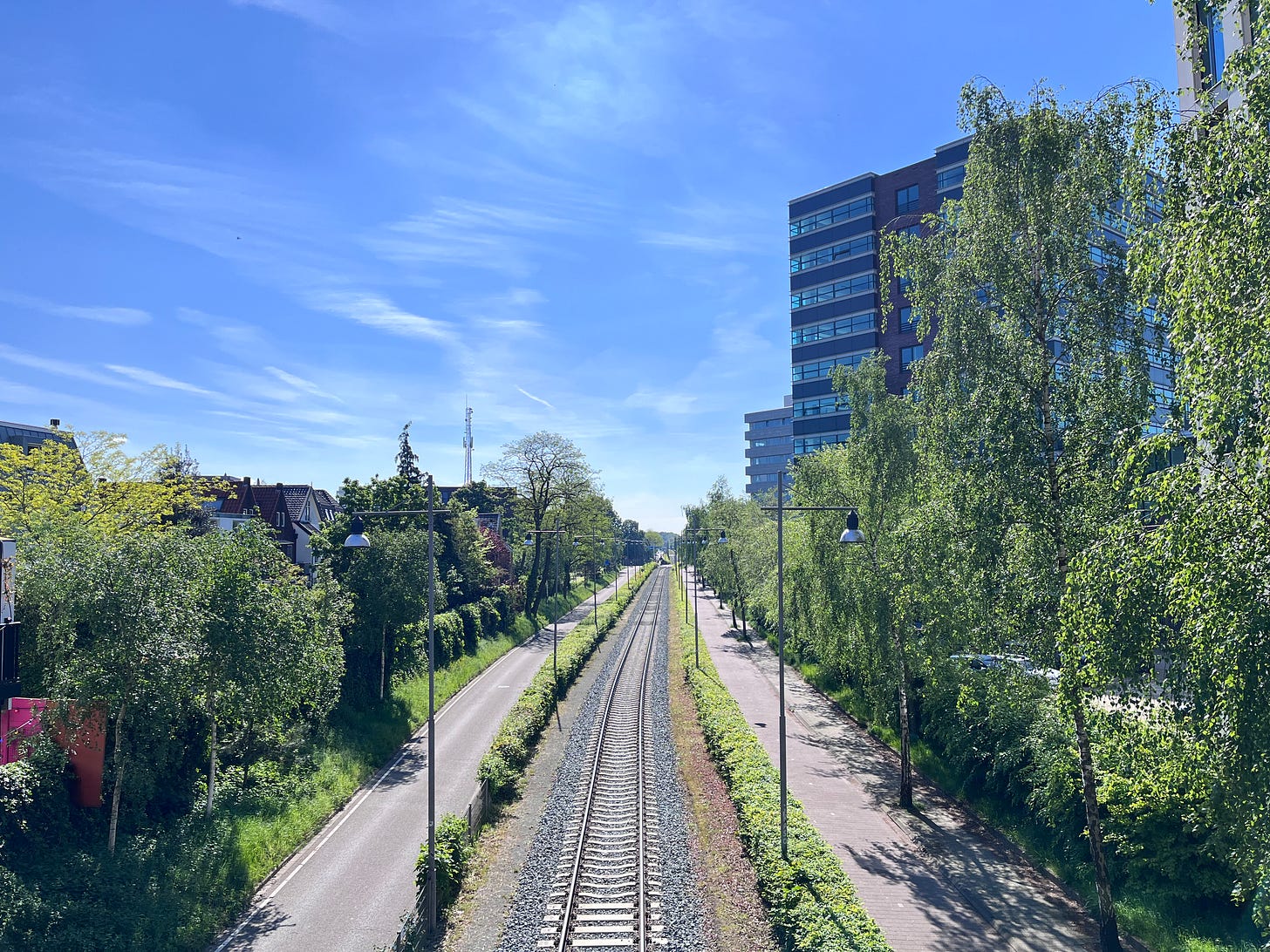The doom of doubt – am I on the right track?
Fearing a strict schedule might be the only way to recover from my long Covid fatigue
Hello, I’m Philippine and to be honest, I feel like a beginner at life – I am forever trying to make sense of it. You can find my attempts at this, plus reflections, musings and experiences right here, in my newsletter. Subscribing is free! For everyone who feels like a beginner at life, and wants to connect in some way.
One of the things I struggle with in my recovery from burnout and long Covid, is the constant and crippling doubt of whether I’m doing the right thing. Will this get me better or should I do something else? Not much is needed for this questioning to be triggered, and it spirals out of control just as easily, to the extent of feeling like I’ll never recover at all. Not only is this a horrible feeling to have, it also genuinely leaves me unsure whether I’m on the right track.
And lately there’s been one thing in particular that I’ve been pondering: whether or not to follow some kind of schedule as a way to pace myself whilst also building up what and how much I do. As I wrote in a previous post, I’ve been trying to embrace this liminal space that is my recovery, meaning I’m staying clear of schedules, planning far in advance and the like, whilst leaning into uncertainty and the unknown, and tuning into my intuition.
But there is a part of me that worries this will lead to nothing. This part thinks that full recovery can only be established through hard work, a plan, a strategy, and some sort of schedule. This worry is more than a vague fear too, it’s based on how I understand my illness.
During the first half of 2023 I followed a recovery programme for chronic fatigue. It largely consisted of gradually increasing how much I did, how many activities and for how long, through following a schedule. And it worked, my energy improved.
To me this isn’t just lucky either, it makes sense to me because I understand my current fatigue1 as a ‘software’ problem as it were. It’s not the hardware – that’s been tested and is all fine. In this video Dr. Will Bostock explains it in a way that rings completely true for me. He says that the issue is with our body’s warning systems.
So in my case, feeling tired is a warning from my body, saying ‘hey, you need to rest’. And normally that’s a good thing, that way you know when to stop and rest, but if this warning system is broken, it gives you the tired feeling when there is no need for it. The symptom is still very real though, meaning I feel tired a lot of the time, when I shouldn’t be. Dr. Bostock compares it to a check engine light in a car. If the light goes on whilst the engine is fine, then the problem is with the light software – the warning system – not with the engine itself.
Since this is how I make sense of my fatigue, gradually exposing myself to more activity seems like a fitting approach. For it is showing my warning system, as it were, that everything is fine, that it doesn’t need to ring its alarm (make me feel tired). Doing so in a gradual fashion is important, since otherwise my warning system would think it needs to ring the alarm as loudly as it can, leaving me completely drained and unable to do anything at all. Exposing myself to more activity gradually and with small steps, however, retrains my brain, hopefully to the point where it doesn’t give off misplaced warning signals anymore.
Of course this is good news. It means that I have an understanding of my elusive illness and that I even have a clue as to what might help me recover. But what if I am unable to do what I need to? It leaves me anxious that the only way for me to get better is to gradually expose myself to more activity by following a schedule. And that is exactly what I don’t feel up to right now, and I might never again.
When I followed the recovery programme, it worked well for me, but only up to a point. I started to get more tired and feel more overwhelmed. It had all started to feel like things I had to do, leading to a strong feeling of resistance to it all. I needed space and time to do what I felt like doing in the moment. This is probably related to the fact that I’m autistic, making me more prone to feeling overwhelmed and stressed.
What my ‘normal’ level of energy and functioning is, I don’t know, as I wasn’t aware that I was autistic before I got ill. So my whole life I tried to live up to neurotypical standards, working too hard, leaving me exhausted and burnt out. What it looks like for me to live a life well suited to who I am, my autism and my energy level, is something I have yet to find out. However, it’s clear to me that at least at this point in my life a strict schedule is not going to be it.
My anxiety is so quick to think that nothing but a terrible conclusion can be drawn: my recovery is doomed. Or, if it’s being optimistic: a schedule is the only way, you just must suck it up and do it. Get that discipline back you once had please. Yes, I did used to be disciplined, and it was probably what had gotten me sick in the first place. Before I got ill I always did (too much of) my school and study work. I didn’t like doing it though, so perhaps I did it out of fear, or simply not realising there was another way. Just like my anxious brain likes to tell me now that there is no other way than to follow a schedule, and deal with its demands.
But maybe then, I always struggled with demands, doing them anyway. And now that I’m free from those systems, free from my fear, free from neurotypical standards, seeing who I really am and what really matters to me, I can no longer struggle my way through those demands.
Alternatively, my ability to deal with demands may come back when I’m fully recovered, although I’m not so sure it will. Either way, following a schedule at this moment appears to be at odds with where I am at in my recovery right now – fully embracing the liminal space that it is, in which I want to feel and sense in each moment what I need, tuning into my intuition.
What, though, if that isn’t a problem, and I actually can recover that way? My anxiety may have been too quick in its conclusion. For there appear to be two assumptions underlying my fear, and they are not necessarily true. It seems like I worried myself into a muddle that isn’t actually there. How very typical, it’s what fear so often does. I think this is a lesson not just regarding my recovery anxiety, but for any situation. It’s a reminder to question my thoughts, especially ones that may take root in fear. It takes me back to the time I studied philosophy, so much of that was about uncovering implicit assumptions that had been made. And with that kind of an investigative eye we sometimes need to look at our own thoughts, curious and without judgement.
Back to my current doubts: even if my understanding of my illness is correct – and my fatigue is basically a misplaced warning signal – is gradual exposure to more activity really the only way to get better? I don’t know if it is, but I like to think that there are many different paths that can lead to my full recovery. And even if there is no other way, my doubt’s second assumption might still be false.
The question is whether a schedule is in fact the only way in which I can gradually expose myself to more activity. I doubt that. In fact, I think I know it isn’t the only way. When I stopped following the recovery programme, and thus stopped following the schedule, I still naturally stretched myself every now and again, and did things for longer than I usually did. And this is something I intend to do more intentionally as I go on, a kind of intuitive gradual exposure.
Finally – and importantly – if that doesn’t work, then I’ll realise so eventually. I don’t need to know now. It seems obvious, but what a revelation, especially to the certainty lover that is me. I can properly give this a go without already knowing if it’s the right thing to be doing for my recovery. If I am on the wrong track, it will become clear at some point and I’ll be able to change course and try something else. In fact, there is no way for me to know already whether this is the right thing and I certainly can’t find out if I keep doubting it. Instead I need to commit to it fully, have faith and just take the leap into the unknown.
What is something you’re doubting; any possibly false assumptions your anxious brain is making; and what are you going to do about it? I’d love to know. Also, any tips on letting go into uncertainty are very welcome.
In this post you can find out a little bit more about me and my journey.
Welcome to Beginner at Life
There’s so much I want to tell you. I want to tell you about my burnout, my long Covid, the hell it’s been and the ways in which I’ve grown. I want to tell you about my autism and the new chapter of my life I’m entering, of rediscovering myself and rediscovering life. I’ve been wanting to tell you for a long time, but I thought it wasn’t the right time yet. I wanted to make everything in order so I could fully focus on it. And in a way, that would be wonderful, but I don’t think I’m able to wait.
This doesn’t apply to the beginning of my burnout four years ago, nor to the beginning of my long Covid more than three years ago. In those initial stages I just needed rest.





"What it looks like for me to live a life well suited to who I am, my autism and my energy level, is something I have yet to find out" - wow!! ✨ Also, you might like to read my posts about demand avoidance and low-demand living: https://neurodivergentnotes.substack.com/p/living-a-low-demand-lifestyle & https://neurodivergentnotes.substack.com/p/am-i-demand-avoidant